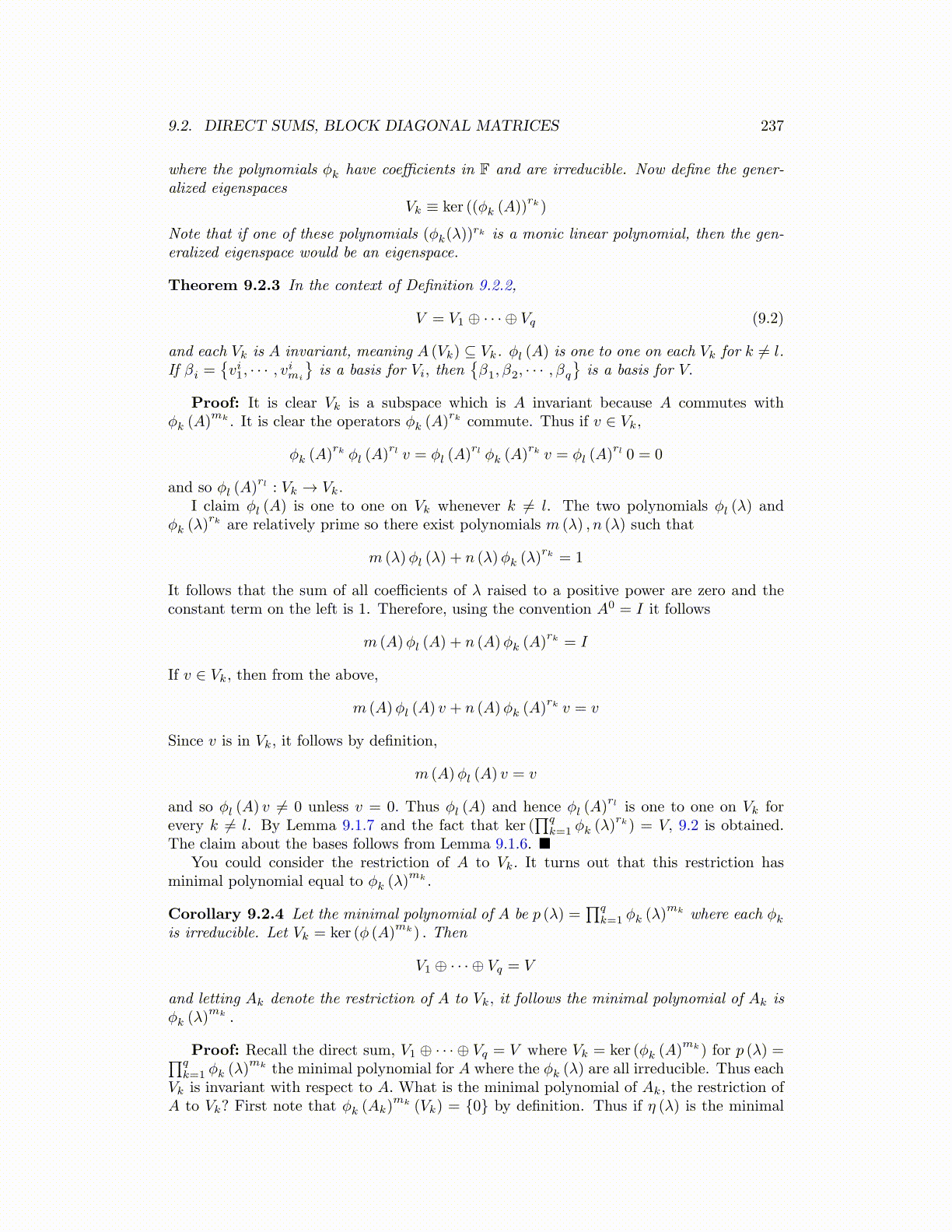
9.2. DIRECT SUMS, BLOCK DIAGONAL MATRICES 237
where the polynomials ϕk have coefficients in F and are irreducible. Now define the gener-alized eigenspaces
Vk ≡ ker ((ϕk (A))rk)
Note that if one of these polynomials (ϕk(λ))rk is a monic linear polynomial, then the gen-
eralized eigenspace would be an eigenspace.
Theorem 9.2.3 In the context of Definition 9.2.2,
V = V1 ⊕ · · · ⊕ Vq (9.2)
and each Vk is A invariant, meaning A (Vk) ⊆ Vk. ϕl (A) is one to one on each Vk for k ̸= l.If βi =
{vi1, · · · , vimi
}is a basis for Vi, then
{β1, β2, · · · , βq
}is a basis for V.
Proof: It is clear Vk is a subspace which is A invariant because A commutes withϕk (A)
mk . It is clear the operators ϕk (A)rk commute. Thus if v ∈ Vk,
ϕk (A)rk ϕl (A)
rl v = ϕl (A)rl ϕk (A)
rk v = ϕl (A)rl 0 = 0
and so ϕl (A)rl : Vk → Vk.
I claim ϕl (A) is one to one on Vk whenever k ̸= l. The two polynomials ϕl (λ) andϕk (λ)
rk are relatively prime so there exist polynomials m (λ) , n (λ) such that
m (λ)ϕl (λ) + n (λ)ϕk (λ)rk = 1
It follows that the sum of all coefficients of λ raised to a positive power are zero and theconstant term on the left is 1. Therefore, using the convention A0 = I it follows
m (A)ϕl (A) + n (A)ϕk (A)rk = I
If v ∈ Vk, then from the above,
m (A)ϕl (A) v + n (A)ϕk (A)rk v = v
Since v is in Vk, it follows by definition,
m (A)ϕl (A) v = v
and so ϕl (A) v ̸= 0 unless v = 0. Thus ϕl (A) and hence ϕl (A)rl is one to one on Vk for
every k ̸= l. By Lemma 9.1.7 and the fact that ker (∏q
k=1 ϕk (λ)rk) = V, 9.2 is obtained.
The claim about the bases follows from Lemma 9.1.6. ■You could consider the restriction of A to Vk. It turns out that this restriction has
minimal polynomial equal to ϕk (λ)mk .
Corollary 9.2.4 Let the minimal polynomial of A be p (λ) =∏q
k=1 ϕk (λ)mk where each ϕk
is irreducible. Let Vk = ker (ϕ (A)mk) . Then
V1 ⊕ · · · ⊕ Vq = V
and letting Ak denote the restriction of A to Vk, it follows the minimal polynomial of Ak isϕk (λ)
mk .
Proof: Recall the direct sum, V1 ⊕ · · · ⊕ Vq = V where Vk = ker (ϕk (A)mk) for p (λ) =∏q
k=1 ϕk (λ)mk the minimal polynomial for A where the ϕk (λ) are all irreducible. Thus each
Vk is invariant with respect to A. What is the minimal polynomial of Ak, the restriction ofA to Vk? First note that ϕk (Ak)
mk (Vk) = {0} by definition. Thus if η (λ) is the minimal